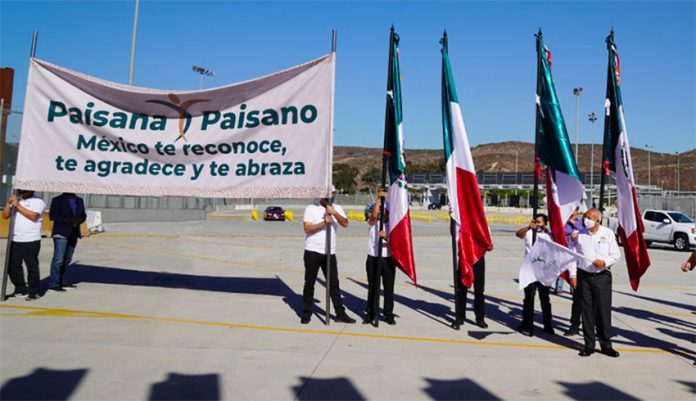Despite a Covid-19 travel ban across the Mexico-United States land border, Mexico’s Programa Paisano got up and running yesterday for the winter season, preparing to welcome home an expected 500,000 Mexican nationals for holiday visits.
The year-round program’s mission is to facilitate the transit of Mexican nationals living in the U.S. and Canada while they visit their home country. The program has special campaigns during the summer and winter, the busiest times of the year for Mexicans living abroad to come back to visit. In 2019, it served 4 million people. This year, it has so far served 600,000, a decrease which officials attribute to the pandemic.
Many of those visitors, living permanently in the United States and Canada, are expected to cross the land border into Mexico which, by agreement between the U.S. and Mexico, is supposed to be closed in both directions to all but essential travel until at least December 21 in order to slow the spread of Covid-19.
But officials with the National Immigration Institute (INM) say it would be impossible to stop Mexicans coming home to see family during the holidays.
“You can’t prohibit a Mexican from exercising his right to return to his home country,” said commissioner Francisco Garduño, adding that the institute will be taking all necessary health safety measures at the border.
Last month, Mexico surpassed 1 million Covid-19 cases. Virtually every state in the country is at least at yellow status on the national coronavirus stoplight map.
The Ministry of Foreign Affairs recently called for “prudence” and encouraged Mexicans to avoid border crossings between Mexico and the U.S. for reasons of recreation, tourism, or “the celebrations that traditionally take place in these months,” but the tone seemed far from authoritative.
“We know that despite the recommendation, they are going to cross the border, so we have to be ready to attend to the needs of migrants who may come to visit their families,” said Luis Gutiérrez, head of the Institute for Mexicans Abroad, a federal agency.
While crossing into the U.S. is generally agreed to be vigilantly monitored to make sure travelers have a valid reason to enter, many report that the situation is not the same going in the opposite direction. In recent months, citizens and lawmakers alike in border states have called upon Mexico to enforce the travel ban supposedly in place. That the Programa Paisano will carry on more or less as usual seems indicative that the situation is not likely to change.
Certainly, at INM’s official launch of the program’s winter campaign this week in Tijuana, attitudes seemed welcoming and even encouraging of Mexicans coming home for the holidays: officials played an upbeat video featuring President López Obrador, who highlighted the contributions of Mexican migrants during times of uncertainty, implicitly referring to billions of dollars in remittances that Mexicans send home each year.
“We are going to protect you and care for you because you are Mexicans, because you are coming to your country, because you help us; and in these times, more than ever, you are supporting us. You deserve the best of treatment, to be received like heroes — our migrant countrymen,” said López Obrador in the video.
As of October 31, Mexicans working abroad, mainly in the U.S., had sent home nearly US $30 billion.
Source: San Diego Union-Tribune (sp)
